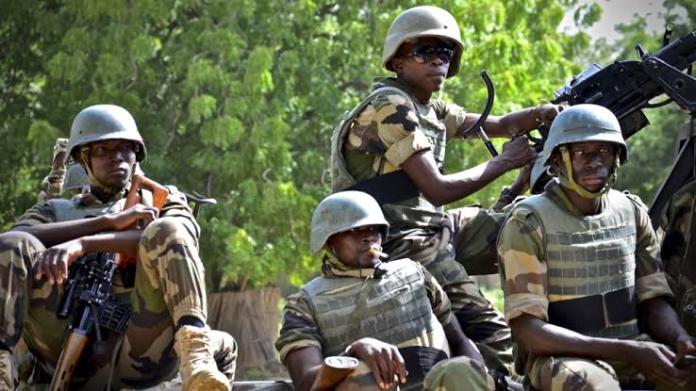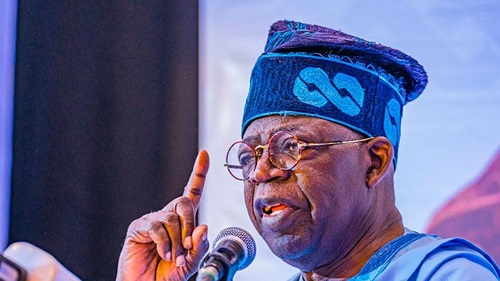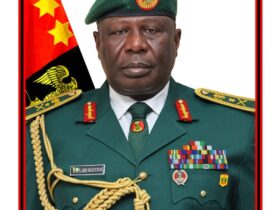By Chidi Omeje
A couple of weeks ago, Nigerians woke up to a heart-numbing report about how unidentified gunmen ambushed and killed about 30 soldiers in a mining village of Ajata Aboki in Shiroro, Niger State.
While still smarting from that shocking news, unconfirmed reports are currently making rounds in the social media that two officers and a number of soldiers of Nigerian Army’s Guards Brigade who were returning to base from the Nigerian Law School, Bwari Abuja where they went to respond to a distress call, were ambushed and killed by gunmen suspected to be terrorists.
For the simple reason that there’s yet no official confirmation of the death of the military officers, I will choose to believe the earlier report on the incident credited to the spokesman of the Guards Brigade to the effect that one officer and two other soldiers were wounded during an ambush by gunmen in Bwari general area. Whatever be the true situation, the indubitable fact remains that for so long now, our gallant and dutiful officers and soldiers have fallen under the deviousness of ambushes made possible by informants and moles who snitch on troops’ position or movement.
This ignoble enterprise of snitching on our troops has two distinct variants of its purveyors: local informants and internal saboteurs. The local informants are mainly members of the community where troops are deployed or are passing through, who for one shady reason or the other, are engaged in spying on the troops for onward transmission to the adversary. The internal saboteurs (otherwise called fifth columnists) on the other hand, are dark members of the military who leak vital information about troops’ operational plans to the adversary. It must be noted that this abhorrent phenomenon is a prominent feature of asymmetric or unconventional warfare, the type that assails Nigeria.
So, for the Nigerian troops engaged in the various internal security operations across the country, the greatest challenge in the task are not the brutality and savagery of the terrorists or their confirmed links with global terror network. It is not even their touted fighting skill or purported ‘invincibility’; the real obstacle standing between the troops and the total and decisive onslaught on the adversary is the nefarious activities of the local network of informants and the internal saboteurs.
As a matter of fact, the amount of damage done to the counter-insurgency and anti-banditry operations of the Nigerian military by local informants and dark members of the military who snitch on troops, is unquantifiable. The sickening irony of victims taking sides with their tormentors to wage battle against their helpers, as typified by the recurring incidence of sabotage against troops, is as confounding as it is irksome. For how is it conceivable that the same people whom the troops are out in the harm’s way to protect are the ones constituting utmost risk to them?
It is certainly an uphill task deconstructing the thought-process of a snitch but what is obvious is that he or she has a loathsome dual personality. Snitches and moles are deceptive, greedy, sly and illusive; the motive and reasons for their actions vacillates from the strange to the ridiculous. However, it is instructive to note that in some cases, past injustices, highhandedness and untold socioeconomic deprivations wrought by bad governance and horrible politics are often the underlying factors that predispose the mindset of snitching. In effect, it takes a lot for a normal, rational thinking person to blatantly carry out subversive actions that clearly hinder the war efforts of his own nation and imperil his own life and living for whatever incentive or compulsion.
Related to the despicable act of sabotage by snitching is the equally reprehensive act of sabotage by gaslighting – the manipulative tactics in which someone secretly undermines another person (or group or a cause) and then turns around to gloat and blame them. Disgruntled politicians, conflict merchants, activists-for-hire and agent provocateurs are culprits here and they often ply their unpatriotic trade using the instrumentality of the media, especially the social media. This is the story of unpatriotic Nigerians who have formed a network of blabbermouths and detractors to work against the efforts and sacrifice of the gallant Nigerian troops who are engaged in a complex battle against insecurity in the country.
As the linchpin in the battle against terrorism, banditry and all forms of organized violent crimes in Nigeria, the Nigerian Army has borne the most brunt of the destructive and obstructive activities of snitches. Day after day in its media update, Nigerians are alerted by the Army on how its troops’ movements and positions are snitched on by locals resulting in most times serious setbacks in operations and fatalities on the part of troops. As a matter of fact, Nigerian Army has lost scores of its troops and equipment owing to the handiwork of these informants and moles-within, and they are not relenting.
Just recently, the Chief of Defence Staff, Gen Lucky Irabor, openly acknowledged the existence of moles in Nigerian military who are working in cahoots with terrorists and bandits to sabotage the operations of the troops. According to the Defence Chief, insider betrayal is taking a heavy toll on military operations across the country. He lamented that “To win the war against terrorism and bring the 13-year old Islamist insurgency and banditry in Nigeria to a close, uprooting traitors and cleansing the security agencies of betrayers should be a major plank of the strategy”. He was spot on.
For a truth, nothing dampens the moral of troops and their willingness to fight than the knowledge of a possible existence of moles within, especially if the commanders and intelligence units are unable to identify and deal with such. With the escalation of this odious enterprise, it is no brainer comprehending why terrorism and banditry are festering in our country, and why surprise attacks on troops have become frequent.
The urgent need to crack and dismantle this devious network of local informants who compromise troops movement cannot be overstated and the responsibility is not that of the military alone. Politicians, traditional rulers, religious and community leaders, activists and media practitioners, and indeed all men and women of goodwill must pay more than a passing interest to this very dangerous development. Taking media spaces to pillory the efforts of the military as a way of remaining relevant or popular is no longer tenable.
The Nigerian Armed Forces on the other hand must see the ugly phenomenon of moles within as a clear and present danger that must be tackled with every seriousness it deserves. Like the CDS rightly observed, our military will not win these battles if it continues to habour in its rank and file, fifth columnists and moles who are dealing it ruthless blows from within. It must step up its counter intelligence measures and administrative procedures aimed at arresting the situation before it is too late. Personnel who leak confidential information or restricted documents are also serious enemies of the state and must be identified and weeded out as a matter of priority.
*Chidi Omeje is the Publisher/Editor-in-Chief, Security Digest (www.securitydigestng.com).











